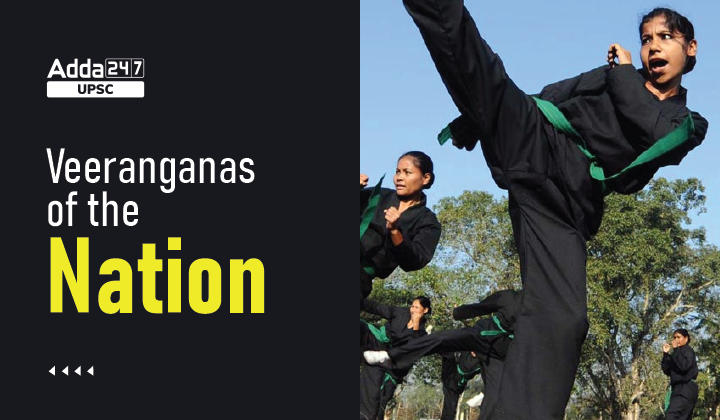Table of Contents
Veeranganas of the Nation- Relevance for UPSC
General Studies I- Modern History and the struggle for freedom.
In News
Prime Minister Narendra Modi’s Independence Day speech underlined the role of women Veeranganas in our freedom movement.
The initiative highlighting the brave women of our freedom struggle, under the broader celebration of Azadi Ka Amrit Mahotsav, will mark a turning point in Indian feminist history writing from an Indic perspective.
Veerangana
Veerangana means a brave female, someone who can fight for their rights. A strong woman not only protects herself, but protects others too.
Role of Veeranganas in Freedom Struggle
- The historical memories of courage and sacrifice are preserved in folktales, songs and regional lore. They reveal the less-celebrated character of Indian society, in which women’s power was acknowledged.
- The PM paid tribute not only to celebrated women but also to unsung veeranganas.
- Rani Lakshmi Bai, the first woman warrior of the revolt of 1857, is known to every young woman in India.
- Begum Hazrat Mahal took to the battlefields along with Lakshmi Bai in 1857 and till her last breath in 1879, fought the British.
- Remembered as the “Agni of India”, Durgawati Devi was an armed revolutionary and active member of the Hindustan Socialist Republican Association and a close associate of Bhagat Singh, Sukhdev and Rajguru.
- Jhalkari Bai, whose tales of bravery have travelled far and wide. Her story presents a social reality where even a Dalit woman had acquired social and cultural significance.
- Uda Devi also belonged to the Dalit community from Awadh, a significant centre during the revolt of 1857. She is said to have formed a women’s battalion, comprising mostly Dalit women, popularly known as “veerangana” or “warrior women.”
- The story of Asha Devi Gurjari follows a similar trajectory — a Dalit, she led women in a bid to restore the political self-respect of the motherland.
These stories of the valour of veeranganas were not limited to any time or area rather, they are of a piece with the national consciousness of the times.
Paying Respect
- The Veeranganas are a potent symbol of nationalism and patriotism.
- They can overturn oppressive attitudes towards women in society.
- Their role and celebration in popular culture also refutes the colonial allegations about the suppression of women throughout Indian history.
PM’s message to the Nation
After the holistic account of the veeranganas, the PM emphasised “nari shakti,” which can be seen in various fields such as law, governance, science, technology, bureaucracy, academics, and politics. He restated the manifold contribution of women in both public and private spaces. But he also highlighted that there is much to be done to “provide opportunities and facilities to our daughters” in order to take the nation to new heights. He further pointed out that “if the considerable efforts of our nari shakti are added to fulfil the dreams in the Amrit Kaal, then it will take less hard work and our time limit will also be reduced. Our dreams will be more intense, vivacious and resplendent.”




 TSPSC Group 1 Question Paper 2024, Downl...
TSPSC Group 1 Question Paper 2024, Downl...
 TSPSC Group 1 Answer key 2024 Out, Downl...
TSPSC Group 1 Answer key 2024 Out, Downl...
 UPSC Prelims 2024 Question Paper, Downlo...
UPSC Prelims 2024 Question Paper, Downlo...




